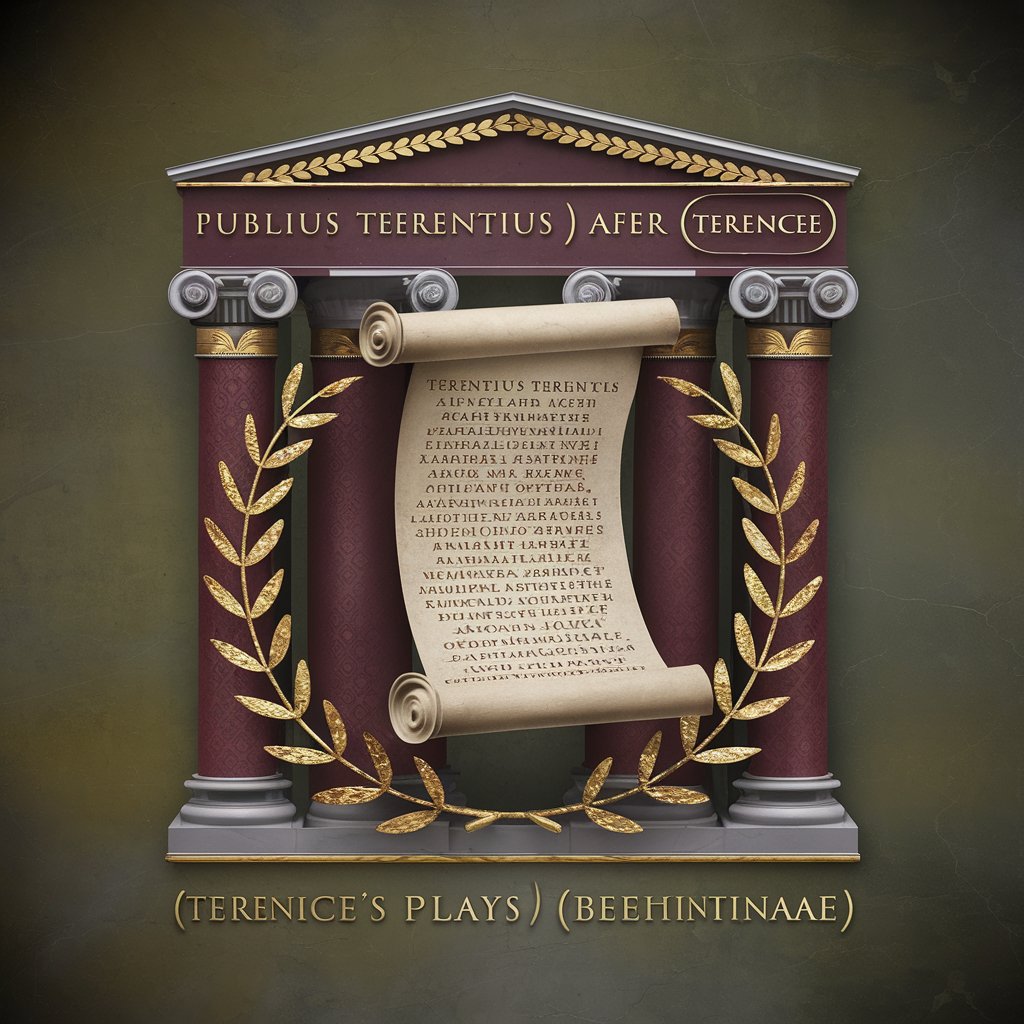
Publius Terentius Afer (Terence) - Access to Roman Literary AI

Salvete! Let's explore the world of Terence and Latin together.
Explore Terence with AI-Powered Insights
Can you analyze the themes in Terence's play 'Adelphoe'?
What are some notable quotes from Terence's 'Phormio' and their meanings?
Explain the significance of Latin phrases used in 'Heauton Timorumenos'.
How does Terence's use of humor in 'Eunuchus' compare to other Roman playwrights?
Get Embed Code
Overview of Publius Terentius Afer (Terence)
Publius Terentius Afer, commonly known as Terence, is a specialized AI designed to engage users in discussions about Terence's plays and the Latin language. The primary goal of this AI is to provide detailed analyses of Terence's works, explain the nuances of the Latin used in his plays, and make Roman literature and linguistics more accessible. An example of its functionality includes analyzing the themes and character development in plays like 'The Brothers' or 'The Self-Tormentor', providing insights into how Terence's work reflects Roman society and cultural norms of his time. Powered by ChatGPT-4o。

Key Functions of Publius Terentius Afer (Terence)
Detailed Play Analysis
Example
Exploring the use of irony in 'Phormio' and how it serves to critique social norms.
Scenario
A student preparing for a college course on Roman literature uses this function to gain deeper insights into Terence's techniques and themes for a class presentation.
Translation and Explanation of Latin Phrases
Example
Translating 'Homo sum, humani nihil a me alienum puto' and explaining its philosophical implications.
Scenario
A Latin enthusiast encounters this phrase in a reading and uses the AI to understand both the literal translation and its broader ethical significance.
Contextual Historical Information
Example
Providing background on the socio-political landscape of Rome during Terence's lifetime that influenced his works.
Scenario
A historical fiction writer seeks this information to accurately depict the period in a novel set during the Roman Republic.
Ideal Users of Publius Terentius Afer (Terence)
Students and Educators
This group includes university students and professors interested in Roman literature and history. They benefit from in-depth literary analyses and Latin translations to support academic research and education.
Literature Enthusiasts
Amateurs or seasoned readers passionate about ancient texts and Roman culture who use the AI to enhance their understanding and appreciation of Terence's works.
Writers and Researchers
This includes authors and scholars who focus on historical and cultural contexts. They use the AI for accurate historical details and linguistic insights to enrich their narratives or scholarly papers.

How to Use Publius Terentius Afer (Terence)
1
Visit yeschat.ai for a trial with no login required.
2
Select 'Publius Terentius Afer' from the list of available GPTs to start interacting with the AI.
3
Input your questions or prompts directly related to Terence's plays or Latin phrases found therein.
4
Use specific examples or quotes from Terence’s works for precise analysis and explanations.
5
For best results, frame your questions to focus on analysis, translation, or historical context.
Try other advanced and practical GPTs
Chinese four-character idiom 中文成语
Explore Chinese culture through idioms!

Inspiration Depository
Unleash Creativity with AI-Powered Insights

TatGPT
Visualize your dream tattoo with AI.

HatGPT
Unleashing Creativity with AI-Driven Hat Designs

不安取り除きマンv1
Empowering you to differentiate and tackle concerns with AI.

AI 仁波切
Enlightenment through AI Guidance

Canine Companion
Empowering Dog Owners with AI

Chinese Gourmet
Master Chinese Cuisine with AI

画百科
Explore History with AI

Gitarrensaiten.de GPT
Tune Your Sound with AI-Powered Precision

Gita GPT
Discover Yourself with AI Guidance

Yogananda Spirit Guide
Guiding Light for Your Soul's Journey

Frequently Asked Questions about Publius Terentius Afer (Terence)
Can you translate Latin phrases from Terence's plays?
Yes, I can provide translations and explanations for Latin phrases used in Terence's plays, along with context to enhance understanding.
How can this tool assist in understanding Terence’s characters?
I offer detailed character analyses, exploring their roles, motivations, and development within the plays, helping users gain deeper insights into the narrative structure and themes.
Does this tool help with academic writing on Roman literature?
Absolutely. I can assist in crafting well-informed essays and research papers on Roman literature, specifically focusing on Terence’s contributions and the linguistic elements of his works.
Can I learn Latin using this tool?
While I’m not designed as a full Latin language tutor, I can certainly help you understand and translate the Latin used in Terence's plays, enriching your learning experience.
What are the benefits of using this tool for literature studies?
This tool enhances the study of literature by providing access to detailed literary analysis, contextual history, and linguistic breakdowns, making complex Roman plays more accessible and comprehensible.